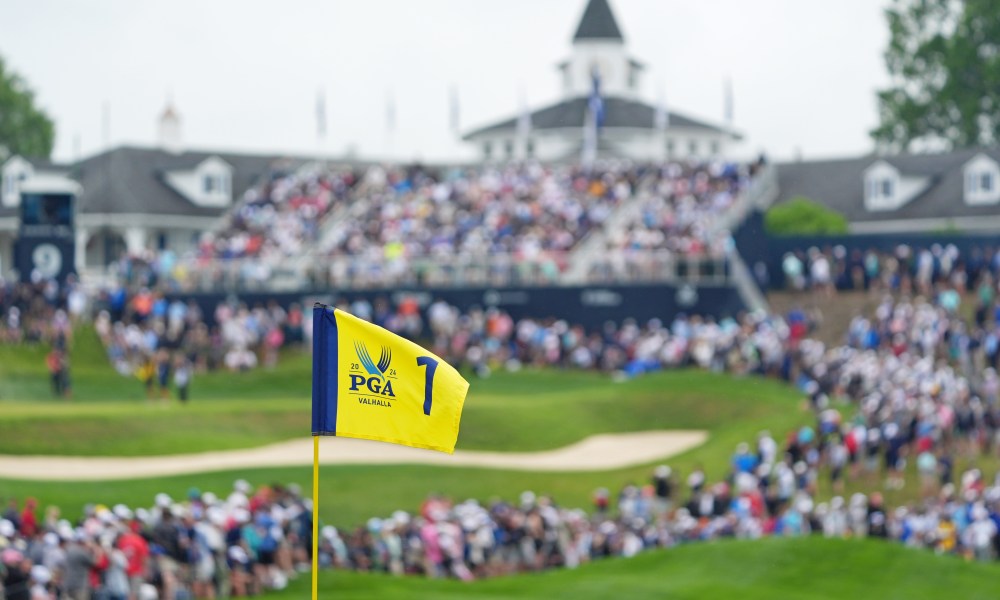Xander Schauffele grabbed the microphone after his one-stroke win in the PGA Championship on Sunday to address the spectators who remained at Valhalla Golf Club’s 18th hole.
“Louisville,” he said. “Did I say it right?”
He passed the pronunciation test and proceeded to tell the crowd, “You guys make this tournament feel even more special than it is.”
The fourth installment of the PGA Championship at Valhalla rallied to leave a much better impression on the world of golfers watching than the tragic and downright unfortunate way the weekend started.
Sunday ended with high drama as Schauffele’s 21-under score set a record for a major championship. He needed to make every stroke as the possibility of a three-way tie for first with Bryson DeChambeau and Viktor Hovland loomed until the final putts on the 18th hole.
The play rose to the occasion of one of golf’s majors and so did the support in Louisville.
So for all the worry about whether the PGA will return from an event first played here in 1996, I’m here to tell you, it will. Louisville is much bigger than its shortcomings. The proof is in how this community shows up. How this community embraces big sporting events.
If that’s not good enough, well, the proof is in the dollar signs.
“This was the all-time, most-attended and highest-revenue PGA (Championship) in their history,” Valhalla club co-owner Jimmy Kirchdorfer said.
He said they not only set records in general admission and hospitality tickets, but the 700,000 square feet of hospitality tents spread out over the course was record-breaking as well.
Now, try to name a professional sports organization that ignores a potential revenue-generating — a record-setting revenue-generating — opportunity. The PGA of America isn’t one of them.
That’s not to say there’s no work to be done.
Valhalla has to get creative in how it will handle parking and pedestrian traffic into the golf club. There’s always been an uneasy mix of people walking along the road with no sidewalk or barriers and the cars that fill two eastbound lanes, two westbound lanes and a fifth turning lane in the middle.
Friday’s tragic death of John C. Mills brought focus into just how dangerous it is.
He was one of the many workers and volunteers that usually remain anonymous who showed up to work as a security guard for a vendor. He was killed when he was hit by a bus crossing over Shelbyville Road trying to enter Valhalla.
That accident led to an embarrassment for the city when Louisville police arrested Scottie Scheffler, the world’s No. 1-ranked golfer, stemming from what he labeled a “misunderstanding” as he tried to enter the course by driving around the scene.
When the charges are inevitably dropped — and the faster it becomes a random trivia question, the better it’ll be for the city — it should ultimately not factor into future events returning.
Kirchdorfer said he had “no doubt” Valhalla would continue to bring major golf events to the city. (He added that the club has “never thought about” being open to a LIV Golf-sponsored event.)
A major golf event may not return as fast as some wish — the PGA Championship has already selected its future sites through 2031. But the wait from the last time it was here was 10 years from Rory McIlroy’s win in 2014, and before that the gap was 14 years from Tiger Woods’ win in 2000.
“Selfishly, I hope it has an opportunity to come back,” said Louisville native and St. Xavier graduate Justin Thomas, who finished tied for eighth at 13 under. “… Louisville shows out when they have the opportunity to (watch golf tournaments), and they did this week.”
The PGA Championship returning to Valhalla came on the 60-year anniversary of Louisville native Bobby Nichols winning the 1964 PGA Championship — his lone major — in Columbus, Ohio. There’s enough of a golf heritage here that it won’t just be hastily disregarded in the future. Maybe even enough that Schauffele’s lead will be followed and people will learn to say the name right.












